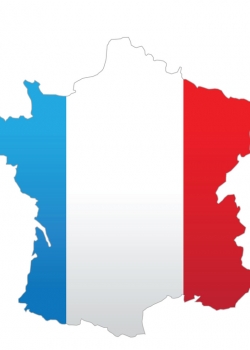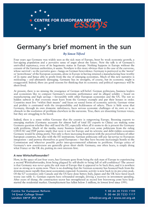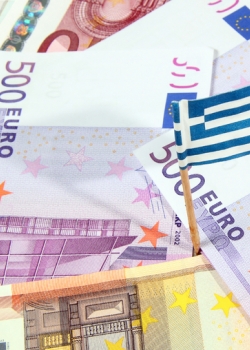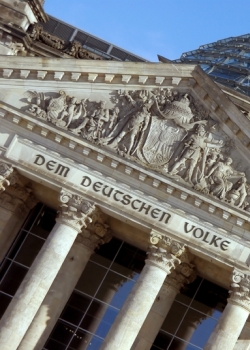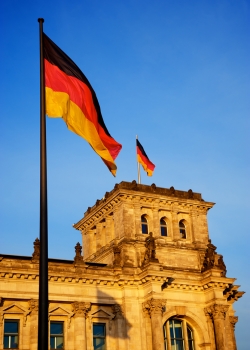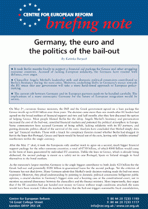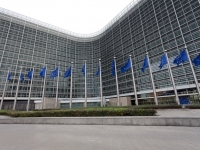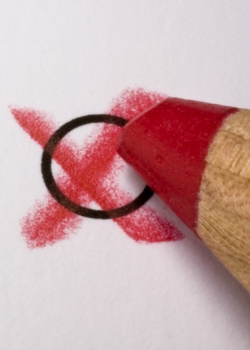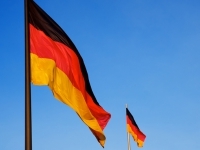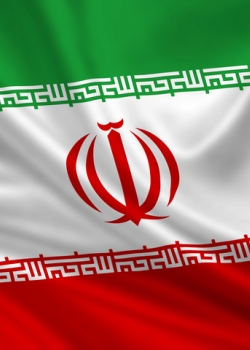The roles & policies of other member-states
Monnet loses to de Gaulle
28 November 2011
The euro crisis is transforming the balance of power in Europe. Germany is emerging, for the first time in the EU’s history, as the unquestioned leader. France is having to adjust to a subordinate role. The euro countries are likely to integrate more closely, leading to a two-speed Europe. Britain...
Merkel's euro shackles
28 September 2011
Chancellor Angela Merkel’s apparent inability or unwillingness to take bold steps could sink the euro. Yet is it even realistic to expect her to overcome growing opposition from within her own coalition government, a hostile public mood and the red lines drawn by a powerful constitutional court? Merkel cannot...
Marine Le Pen and the rise of populism
20 July 2011
Marine Le Pen's anti-EU populism resonates in much of northern Europe. Debating the CER's director, Charles Grant, she claimed she was neither left nor right.
Germany's brief moment in the sun
27 June 2011
Four years ago, Germany was widely seen as the sick man of Europe, beset by weak economic growth, a fast-ageing population and a pervasive sense of angst about the future.
Issue 76 - 2011
28 January 2011
- European political parties are the key to EU legitimacy, Sir Julian Priestley
- A new opportunity for EU foreign policy, Charles Grant, Katinka Barysch, Tomas Valasek
- Is Germany really rebalancing?, Simon Tilford
Ireland’s election and the EU: From poster child to enfant terrible?
28 January 2011
Ireland will elect a new government on February 25th to replace a discredited administration loathed by most Irish voters. At first sight, it seems unlikely the election will re-open the fundamentals of a bail-out agreed with fellow eurozone members and the IMF last November.
Can Greece be saved?
20 January 2011
Will Greece have to restructure its debt? Among most West European economists and investors, this now seems to be a foregone conclusion.
The 'new' Poland and its neighbours
29 November 2010
Poland is shedding its 'new member-state' image and is instead trying to join the exclusive club of big EU countries. It is a laudable and so far largely successful goal, but not one without risks.
Europe dances to Germany's tune
03 November 2010
For much of this year, the response of European leaders to the eurozone crisis has been hesitant and fractious. But when the European Council met in Brussels on October 28th and 29th, the EU appeared to be acting with greater purpose and sense of direction.
The political consequences of the euro crisis
01 October 2010
The eurozone crisis is changing the way the EU works. It is reinforcing a number of trends that had already been visible over the last decade or so: a shift towards a Union in which governments are in the driving seat, large countries matter more than small ones, and more decisions are taken by subsets of member-states.
Has Germany become Europe's locomotive?
02 September 2010
The German economy has been growing exceptionally strongly of late. In the second quarter of 2010, it expanded faster than any other economy in the G7 and faster than at any time since the country’s reunification in 1990.
Germany, the euro and the politics of the bail-out
28 June 2010
Germany agreed to support its eurozone partners only slowly and reluctantly. Domestic political constraints and Angela Merkel's caution were partly to blame.
The dangers of a disgruntled Germany
07 May 2010
Germany has finally agreed to help bail out Greece. The negotiations were acrimonious and took months. Angela Merkel’s hesitation and prevarication have increased the cost of the bail-out and unsettled financial markets.
Why Christine Lagarde is right about Germany
26 March 2010
Greece’s recent fiscal travails have, slightly unexpectedly, thrown the spotlight on Germany’s current-account surplus. In mid-March, France’s finance minister, Christine Lagarde, urged Germany to do more to boost domestic demand – a call echoed by the European Commission’s president, José Manuel Barroso.
What Eastern Europe can learn from the crisis
11 November 2009
It is 20 years since the Berlin Wall crumbled and political and economic freedom started spreading through Eastern Europe. Today, however, the region is mired in deep recession.
Greece: Nowhere to hide
08 October 2009
The Greek economy is on a very dangerous course. Unless the government takes steps to boost productivity and strengthen public finances, Greece faces a bleak future.
The Czechs will probably ratify the Lisbon treaty this year
02 October 2009
Any prediction about the timing of the Czech Republic’s ratification of the Lisbon treaty must be heavily qualified; politics in Prague are so complex and opaque that many Czechs find it hard to understand what is going on.
Europe leaves behind the era of treaty change
01 October 2009
Ireland’s decisive yes to the Lisbon treaty is likely to spur Poland and – after some delay – the Czech Republic to ratify. The Lisbon treaty will probably enter into force early next year, and that is good news for the EU, in three ways.
First, the EU will move on...
First, the EU will move on...
Westerwelle for finance minister
29 September 2009
Guido Westerwelle is the undisputed winner of Sunday’s election in Germany. His Liberal Democratic Party (FDP) attracted almost 15 per cent of the vote, its highest share ever. Angela Merkel will remain chancellor although her Christian Democratic Union (CDU) did slightly worse than in the 2005 election.
Issue 67 - 2009
31 July 2009
- Iran's nuclear problem: Ever harder to fix, Tomas Valasek
- Britain and the EU: The cost of leaving, Simon Tilford
- Scotland's bid to join the EU, Hugo Brady



